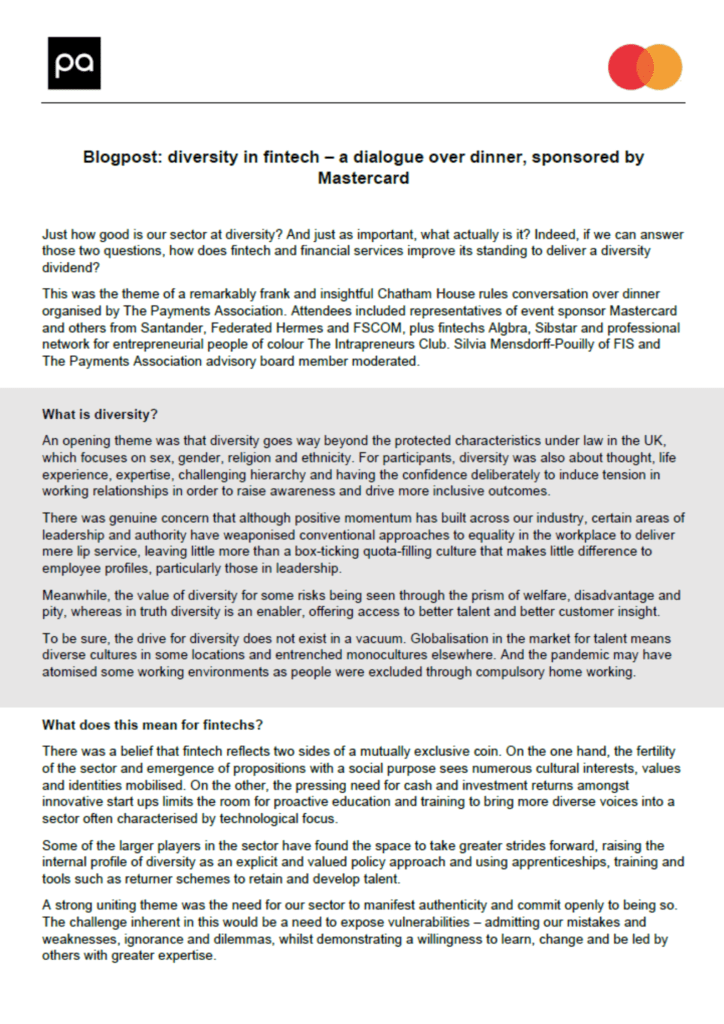
Just how good is our sector at diversity? And just as important, what actually is it? Indeed, if we can answer those two questions, how does fintech and financial services improve its standing to deliver a diversity dividend?
This was the theme of a remarkably frank and insightful Chatham House rules conversation over dinner organised by The Payments Association. Attendees included representatives of event sponsor Mastercard and others from Santander, Federated Hermes and FSCOM, plus fintechs Algbra, Sibstar and professional network for entrepreneurial people of colour The Intrapreneurs Club. Silvia Mensdorff-Pouilly of FIS and The Payments Association advisory board member moderated.
What is diversity?
An opening theme was that diversity goes way beyond the protected characteristics under law in the UK, which focuses on sex, gender, religion and ethnicity. For participants, diversity was also about thought, life experience, expertise, challenging hierarchy and having the confidence deliberately to induce tension in working relationships in order to raise awareness and drive more inclusive outcomes.
There was genuine concern that although positive momentum has built across our industry, certain areas of leadership and authority have weaponised conventional approaches to equality in the workplace to deliver mere lip service, leaving little more than a box-ticking quota-filling culture that makes little difference to employee profiles, particularly those in leadership.
Meanwhile, the value of diversity for some risks being seen through the prism of welfare, disadvantage and pity, whereas in truth diversity is an enabler, offering access to better talent and better customer insight.
To be sure, the drive for diversity does not exist in a vacuum. Globalisation in the market for talent means diverse cultures in some locations and entrenched monocultures elsewhere. And the pandemic may have atomised some working environments as people were excluded through compulsory home working.
What does this mean for fintechs?
There was a belief that fintech reflects two sides of a mutually exclusive coin. On the one hand, the fertility of the sector and emergence of propositions with a social purpose sees numerous cultural interests, values and identities mobilised. On the other, the pressing need for cash and investment returns amongst innovative start ups limits the room for proactive education and training to bring more diverse voices into a sector often characterised by technological focus.
Some of the larger players in the sector have found the space to take greater strides forward, raising the internal profile of diversity as an explicit and valued policy approach and using apprenticeships, training and tools such as returner schemes to retain and develop talent.
A strong uniting theme was the need for our sector to manifest authenticity and commit openly to being so. The challenge inherent in this would be a need to expose vulnerabilities – admitting our mistakes and weaknesses, ignorance and dilemmas, whilst demonstrating a willingness to learn, change and be led by others with greater expertise.
There was a sense that the payments industry has a natural advantage because it is at the sharp end of people’s lives – present at the point of purchase. This unforgiving coalface naturally drives the sector to complement the spending behaviours of multiple identities, cultures and values. For some, this has exposed the way in which diversity means better business decisions and genuine value creation.
So what next?
Key is authentic ownership by leaders, safe spaces for organisations to agree what diversity means for them beyond the purely legal, openness about fears and mistakes, and relentless enthusiastic encouragement of difference. Fintech and financial services can lead on diversity but not without candid self-appraisal.
Thanks to: Josh Berle; Alison Donnelly; Sharla-Jaye Duncan; Jason Field; Sonny Gupta; Paul Horlock; Ingrid Kukuljian; Andy Patton; Jennifer Rademaker; and Jayne Sibley for their openness and honesty. Particular thanks too to Silvia Mensdorff-Pouilly for moderating so sensitively.
The Payments Association
St Clement’s House
27 Clements Lane
London EC4N 7AE
© Copyright 2024 The Payments Association. All Rights Reserved. The Payments Association is the trading name of Emerging Payments Ventures Limited.
Emerging Ventures Limited t/a The Payments Association; Registered in England and Wales, Company Number 06672728; VAT no. 938829859; Registered office address St. Clement’s House, 27 Clements Lane, London, England, EC4N 7AE.







Log in to access complimentary passes or discounts and access exclusive content as part of your membership. An auto-login link will be sent directly to your email.
We use an auto-login link to ensure optimum security for your members hub. Simply enter your professional work e-mail address into the input area and you’ll receive a link to directly access your account.
Instead of using passwords, we e-mail you a link to log in to the site. This allows us to automatically verify you and apply member benefits based on your e-mail domain name.
Please click the button below which relates to the issue you’re having.
Sometimes our e-mails end up in spam. Make sure to check your spam folder for e-mails from The Payments Association
Most modern e-mail clients now separate e-mails into different tabs. For example, Outlook has an “Other” tab, and Gmail has tabs for different types of e-mails, such as promotional.
For security reasons the link will expire after 60 minutes. Try submitting the login form again and wait a few seconds for the e-mail to arrive.
The link will only work one time – once it’s been clicked, the link won’t log you in again. Instead, you’ll need to go back to the login screen and generate a new link.
Make sure you’re clicking the link on the most recent e-mail that’s been sent to you. We recommend deleting the e-mail once you’ve clicked the link.
Some security systems will automatically click on links in e-mails to check for phishing, malware, viruses and other malicious threats. If these have been clicked, it won’t work when you try to click on the link.
For security reasons, e-mail address changes can only be complete by your Member Engagement Manager. Please contact the team directly for further help.